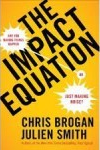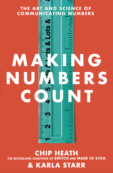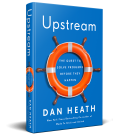Dan Ariely, author of Predictably Irrational and The (Honest) Truth about Dishonesty , is offering a 6-week course on Coursera. This is a great chance to learn from a brilliant professor without paying Duke-level tuition…
, is offering a 6-week course on Coursera. This is a great chance to learn from a brilliant professor without paying Duke-level tuition…
Register for Dan Ariely’s online course!
How to be more confident in your charitable giving
It’s giving season. (About a third of annual charitable giving happens in December.) You want to do good with your money, but who should you give to? It’s hard to find trustworthy information. It’s hard to know whether you’re really making a difference.
Enter Givewell. They have a team of full-time analysts who spend all their time pursuing a simple mission: Figuring out which charities are having the most impact. They dig through the research, they make the phone calls, they visit the field sites. And every year, based on this obsessive research, they release a list of “top picks.”
They just released this year’s list: Here are Givewell’s top 3 picks for 2012. If you want to feel more confident that your charitable donations are making a difference, you’ve just found your answer. (Btw, I put my time & money where my mouth is! After a few years of relying on their picks, I recently joined the Givewell board.)
3 QUESTIONS FOR CHRIS BROGAN

Chris Brogan and Julien Smith, authors of Trust Agents, have just released a new book called The Impact Equation, which offers some clear-headed thinking about how people can be heard above the din of the crowded media universe. We asked Chris three questions about it:
1. A lot of people in the business world seem to feel obligated to have a “social-media strategy,” and often their efforts come across as energetic but pointless, as though they were afraid they’d end up on the Betamax side of history if they didn’t tweet frequently. What are they doing wrong?
People were told that social media would solve their problems with regards to the declining effectiveness of traditional marketing, sales and service channels. But that’s like saying, “If I give you this telephone, you will start making tons of money.” It’s just not true.
The challenge for companies (of any size, and serving b2b or b2c markets) is to find a way to build sustainable, relationship-minded business processes that account for the new buying methods of an educated, mobile, personalization-minded buying market. Some of what online tools do well is address all of this. But that’s like saying a great pen will help you write better. It’s not about the tools. It’s about a choice to understand how to stand out as a provider of value above-and-beyond-the-sale to one’s customer base.
2. And I know the same is true with individuals: The fact that technology makes our voices easier to hear doesn’t mean that people will listen. So let’s say you’re approached by the author of a just-completed sci-fi novel, or an entrepreneur who has almost finished a great app, and they want to know, “How do I start building a base for my work?” What can you tell them? What should they do in the next 3 months?
Let’s say that you’ve got the most amazing new whatever, that sci fi book or that amazing app that lets me share photos with my pets. Bringing it out to the public is like getting a shiny new bike and showing up at the playground to find out that everyone also has a shiny new bike. It’s hard to get people’s attention. What we say about that in the Impact Equation is to look for Echo.
Echo is the idea that you help people see themselves in your idea/project/product/whatever. If I’m hoping to spend a few months finding buyers, I’ll want to find the kind of person who will recognize themselves in my work. I’ll post blog posts maybe so that people can find me via search. I’ll use social networks like Twitter and Google+ and search for people who use keywords that would appeal to the person I’m hoping to attract. I’ll learn about them and not instantly pounce on them with my offer. And I’ll write content that shows people how what I do will make their lives more interesting/useful/healthy or whatever it is I’m promising.
3. OK, this is like a Deep Tracks-for-authors question. Tell us about an idea in the book that you were excited about but that none of your readers seem to be picking up on (yet)…
The book suffers from having two authors widely known as online media types. People believe before reading it that it’s a book about how to get more out of Twitter or the like. Yes, we tend to paint with a digital brush more often than not, but we have lots of examples within that have nothing to do with a choice of technology, and often nothing at all to do with even marketing or promotion. A quarter of the book is about how to improve ideas. You can use ideas pretty much anywhere (I say with tongue firmly in cheek).
What we’ve dubbed The Attention War is raging. Whether it’s online or off, people’s ideas just aren’t spreading as far as they used to, and with that as a backdrop, we wrote a book we think will help you rectify that experience. Apply it to marketing, sales, service, or just your life. We think it’ll fit.
3 QUESTIONS FOR DAN ARIELY

Dan Ariely, author of the books Predictably Irrational and The Upside of Irrationality, recently released his third book, The Honest Truth About Dishonesty: How We Lie to Everyone—Especially Ourselves. Despite its sobering central finding—that essentially everyone cheats a little when given the opportunity to do so—it’s a playful and fascinating read.
To celebrate the launch of the book, we asked Dan three questions about it:
1. Dan, in your book you describe some experiments where college students consistently cheat to make a bit more money for themselves. But if you give them a “moral reminder” — i.e., asking them to sign their name to their university’s honor code as part of the task — then suddenly they don’t cheat anymore. I don’t know whether to be encouraged or depressed by this. I mean, is our morality dependent on our being reminded of it?
Encouraged or depressed? I think that this book should lead us to both. The main point of the book is that dishonesty is not limited to a few bad individuals, and that instead a lot of us can be dishonest and at the same time think well of ourselves. This is the bad news. The first part of the good news is that we only feel OK when we cheat a little bit, and because of that we don’t cheat much. In fact we cheat much much less than the standard economic theory would lead us to suspect. The second part of the good news is that we can influence the amount of dishonesty with very simple tools. For example, when we get people to recite the ten commandment, sign an honor code and other such interventions people cheat to a much less degree (often not at all). This is the good news. We all want to think of ourselves as honest, we basically want to be good, and as long as there are sufficient reminders around us we are going to behave better.
And what about morality? Should we think of people as having no backbone? Inline with much of the research in social psychology over the past 50 years, it is important to realize that the behavioral unit is not a person, but a person within a particular environment. The same person can behave very differently in different environments — which is why it is so important to figure out the exact environment and its effects on us. This is also why I think that it is important to understand dishonesty and redesign our environment in ways that would not tempt good people to behave badly.
2. On that last point, if people are looking to set up an environment that discourages dishonesty (e.g., preventing shrinkage in a retail environment or something like that), what kinds of factors should they be thinking about?
Here are the main lessons from the book about what kinds of actions can decrease dishonesty — and interestingly they are basically lessons that come from looking at religion.
1) Make the rules more black and white. Gray zones are basically very good to allow flexibility but they tempt us to read them in ways that are good or our short-term best interests — not in our long-term interest and not in the best interest of our company or clients. Think about rules for expense reports, business decisions, accounting etc. This is also true for personal rules about dieting, shopping etc
2) Clear moral standards and professional codes of ethics can be very useful in making the rules simpler and helping people behave better. And the more specific the rules are the more effective they can be.
3) Reminding people about their own moral obligations does a lot to decrease dishonesty. And this works even when we get self-declared atheists to swear on the bible.
4) If someone has misbehaved, a procedure like the Catholic confession where they get to say what they have done wrong and then express how sorry they are helps to open a new page, and reset the level of dishonesty to a much reduced level.
5) When the distance between our action and the final consequence is larger people are more likely to misbehave. When we deal with people who are far away, that we don’t know personally when we deal with transactions that are further from money — dishonesty increases. The lesson here is to try and make this distance lower, and get people to more clearly see the outcomes of their actions.
6) Conflicts of interests are much more influential than we think. We don’t appreciate how much they change the perspective of other people and for sure we don’t see how they work on us. As our appreciation for the power of conflicts of interests increases the more we are likely to stand guard and be more cautions when they arise.
3. So are you going to try out any of these principles on your students next semester? (Not to imply that MBA students would ever cheat, or even think of cheating…)
What I am going to try next is this:
1) I am going to sign an agreement with the students about the code of conduct in the class. This will include no email and web during class, doing their homework, and no collaborative work on papers and exams.
2) I will remind the students about the agreement at the beginning of each class by having the first slide show them the agreement.
3) Before the final exam I am going to ask them to write out their version of the honor code and hope that this will remind them to the largest extent who they really want to be.
RARE: Finding the bright spots in conservation
Check out this great piece in the Times on Rare, the conservation organization we wrote about in Switch. (I was so inspired by the Rare team’s work, in fact, that I signed up as a trustee.) Rare’s strategy is focused on bright spots — finding what’s working and doing more of it.
Btw, the author of the NYT piece, David Bornstein, also wrote a terrific book called How to Change the World.



